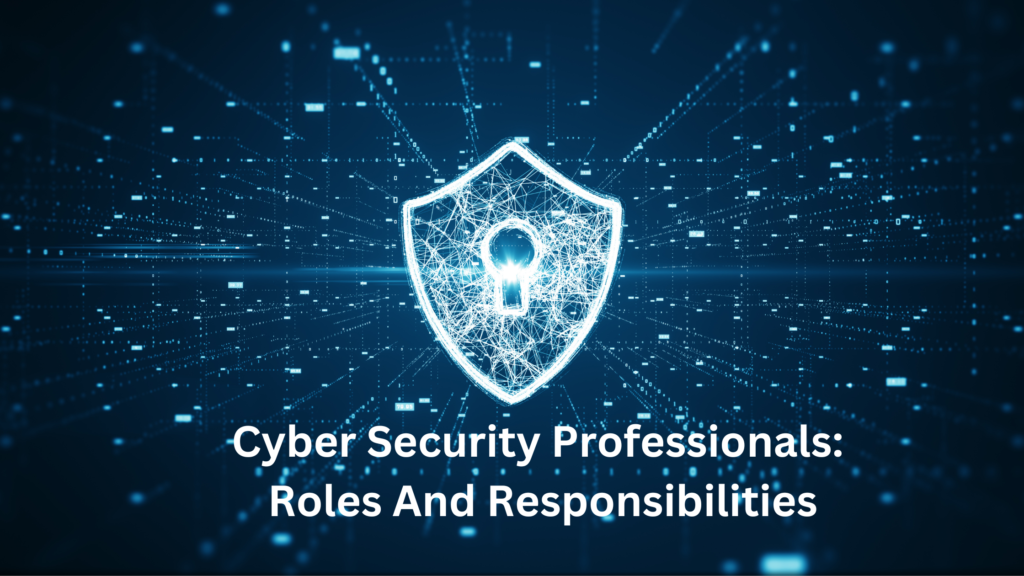Roles of the Cyber Security Professional, Responsibilities, and Three Critical Skills for Cyber Security Professionals

Table of Contents
- Roles of the Cyber Security Professional
- Responsibilities of the Cyber Security Professional
- Three Critical Skills for Cyber Security Professionals
- Conclusion
Introduction:
In today’s interconnected world, where cyber threats continue to evolve and multiply, the role of a cyber security professional has become more vital than ever before. Organizations of all sizes and sectors require skilled experts who can safeguard their digital assets and protect sensitive information from malicious actors. This blog post explores the roles and responsibilities of a cyber security professional, shedding light on the critical skills required to excel in this field.
I. Roles of the Cyber Security Professional:
A. Threat Detection and Prevention:
- Implementing security measures to detect and mitigate cyber threats.
- Conducting vulnerability assessments and penetration testing.
- Monitoring network traffic and system logs for suspicious activities.
B. Incident Response and Recovery:
- Developing and implementing incident response plans.
- Investigating and containing security incidents.
- Restoring systems and processes after an attack or breach.
C. Security Architecture and Design:
- Designing secure networks, systems, and applications.
- Implementing access controls and encryption mechanisms.
- Evaluating and selecting security technologies and solutions.
D. Security Awareness and Training:
- Educating employees on best practices and security policies.
- Conducting security awareness campaigns and workshops.
- Promoting a culture of security within the organization.
II. Responsibilities of the Cyber Security Professional:
A. Risk Assessment and Management:
- Identifying potential risks and vulnerabilities.
- Conducting risk assessments to prioritize security measures.
- Developing risk mitigation strategies and contingency plans.
B. Policy and Compliance:
- Developing and enforcing security policies and procedures.
- Ensuring compliance with industry regulations and standards.
- Conducting audits and assessments to measure compliance.
C. Collaboration and Communication:
- Collaborating with stakeholders to understand security requirements.
- Working closely with IT teams to implement security controls.
- Communicating security incidents, risks, and strategies to management.
D. Continuous Monitoring and Improvement:
- Monitoring the effectiveness of security controls and measures.
- Staying updated with the latest security threats and trends.
- Continuously improving security processes and strategies.
III. Three Critical Skills for Cyber Security Professionals:
A. Technical Expertise:
- In-depth knowledge of operating systems, networks, and protocols.
- Proficiency in security tools, such as firewalls, intrusion detection systems, and SIEM solutions.
- Understanding of cryptography, secure coding practices, and ethical hacking techniques.
B. Analytical Thinking and Problem-Solving:
- Ability to analyze complex security incidents and vulnerabilities.
- Aptitude for identifying patterns and trends in data.
- Skill in developing innovative solutions to security challenges.
C. Communication and Leadership:
- Strong communication skills to convey complex security concepts to non-technical stakeholders.
- Ability to lead and collaborate with cross-functional teams during incident response.
- Skill in influencing and persuading others to prioritize security.
Conclusion:
As the digital landscape continues to expand, cyber security professionals play a crucial role in protecting organizations from cyber threats. Their responsibilities span from threat detection and prevention to incident response and recovery. To excel in this field, professionals must possess critical skills such as technical expertise, analytical thinking, and effective communication. By fulfilling their roles and responsibilities and developing these essential skills, cyber security professionals contribute to a safer digital environment for businesses and individuals alike.

Leave a Reply